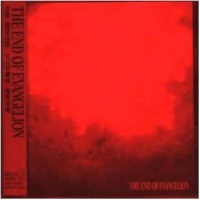End of Evangelion (Soundtrack)
| The End of Evangelion | |

| |
| Media Type | Audio CD |
|---|---|
| Author | Shiro Sagisu |
The End of Evangelion is the soundtrack album of The End of Evangelion. It features music composed and conducted by Shiro Sagisu. It also features the ending theme as well as Johann Sebastian Bach's Air on the G String and Herz und Mund und Tat und Leben, BWV 147. It was released on September 26, 1997 on King Records's Starchild label, peaking at number 3 on Oricon's albums chart. Geneon Entertainment released the album on May 11, 2004 in North America.
Track Listing
All music composed by Shirō Sagisu except where otherwise noted.
| The End of Evangelion | |||||||||
|---|---|---|---|---|---|---|---|---|---|
| No. | Title | Lyrics | Music | Length | |||||
| 1. | "Interference of Others" (他人の干渉 Tanin no Kanshō) | 2:17 | |||||||
| 2. | "The End of Midsummer[1]" (真夏の終演 Manatsu no Shūen) | 2:18 | |||||||
| 3. | "Emergency Evacuation to Regression" (退行への緊急避難 Taikō he no Kinkyūhinan) | 4:12 | |||||||
| 4. | "False Regeneration" (偽りの、再生 Itsuwari no, Saisei. This is a different mix than that found on "Evangelion Death") | 2:25 | |||||||
| 5. | "Substitute Invasion" (身代わりの侵入 Migawari no Shinnyū) | 3:25 | |||||||
| 6. | "II Air [Orchestral Suite No. 3 in D Major, BWV 1068]" | Johann Sebastian Bach | 3:21 | ||||||
| 7. | "The Flow of Emptiness" (空しき流れ Munashiki Nagare) | 6:13 | |||||||
| 8. | "Thanatos -If I Can't Be Yours- [2]" | Mash | Loren & Mash | 4:48 | |||||
| 9. | "Escape to The Beginning" (始まりへの逃避 Hajimari he no Tōhi) | 4:54 | |||||||
| 10. | "Honeymoon with Anxiety" (不安との密月 Fuan to no Mitsugetsu) | 1:35 | |||||||
| 11. | "Komm, süsser Tod (M-10 Director's Edit Version)" | Hideaki Anno, Mike Wyzgowski, Shirō Sagisu | Arianne | 7:41 | |||||
| 12. | "Jesus bleibet meine Freude [Herz und Mund und Tat und Leben, BWV 147]" | Jan Panenka, Johann Sebastian Bach, Myra Hess | 4:46 | ||||||
| 13. | "Expansion of Blockade [3]" (閉塞の拡大 Heisoku no Kakudai) | 6:49 | |||||||
| 14. | "Gap of Dream" (夢のスキマ Yume no Sukima) | 1:24 | |||||||
Total length: |
53:28 | ||||||||
Notes
- ↑ Literally, shūen refers to the "end of a performance."
- ↑ A vocal and jazz version of Thanatos from Neon Genesis Evangelion OST II.
- ↑ A part of this record is based on Rei III from the Neon Genesis Evangelion OST II album.
